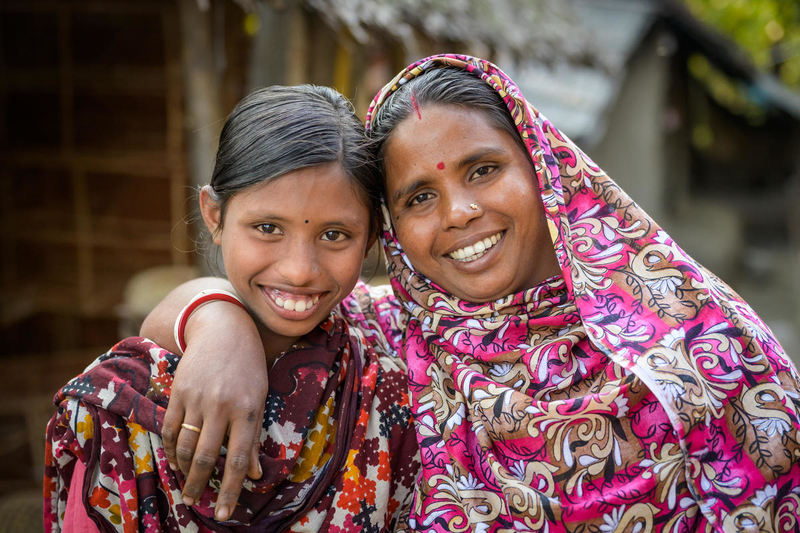In southwest Bangladesh, 26.7 percent of households live below the poverty line of $1.90 a day. At this level of poverty, called “ultra poor,” events like natural disasters or an injury that requires urgent medical care can spell doom. That’s how it felt for the Das family.
The family couldn’t make ends meet on father Arobindo’s salary as a van driver. Then within months of each other, mother Shabitri got appendicitis and daughter Modhumala was diagnosed with a bone tumor in her leg. Financially, medical treatment seemed impossible — so the family had to go door to door, depending on the generosity of their neighbors.
“I thought, ‘Why is God doing this to me?’” says Shabitri. “Why is there test after test?”

World Vision and USAID team up to change lives
“The money my husband earned wasn’t enough. There was not a single day that we didn’t quarrel with each other. We weren’t able to buy enough food. I was not able to feed my children. I thought throughout my life I would struggle with poverty and we would be unhappy forever.”
But now, many households like the Das family are radically transforming their lives, thanks to entrepreneurial training from Nobo Jatra, a five-year food security and development program implemented by World Vision and funded by U.S. foreign assistance (USAID). As part of its “ultra-poor graduation” project, Nobo Jatra has helped 14,000 women get the business skills (including basic literacy and numeracy) and minimal startup costs needed to help them launch small businesses.
“When Nobo Jatra gave me a book in my hand, I felt so happy,” says Shabitri. “It was hard for me, as I was totally illiterate. But I practiced with my daughter at night. Now I can calculate basic math. Now I can write. I can read.”

New skills, new businesses!
Shabitri used her training and startup money to establish a bamboo weaving business and a small grocery shop: “I like this business because at the same time I can do my household activities,” she says. “I can do bamboo and the grocery shop and I can take care of my child.”
She expects to be able to pay off the costs of starting her businesses soon. She and the other women who have participated in Nobo Jatra’s entrepreneurial literacy program have “graduated” from extreme poverty and are helping others in their community do the same.
“Though I cannot help people with a big amount of money, I can help them, even if it is little,” she says, remembering how her family once relied upon their neighbors.

Das Family breaks away from child marriage
Shabitri’s household is “a model for others,” according to Ratindra Nath Roy, a Nobo Jatra technical officer in Ultra Poor Graduation.
In addition to entrepreneurship, as part of Nobo Jatra’s training, families learn about the dangers of child marriage and learn how to report it or to find authorities to intervene. This hit home for Shabitri, who was married to Arobindo when she was 11.
“Child marriage was common,” she says. “But from Nobo Jatra, I know the demerits. Girls must be married after 18. The difficulties I faced in my life came from child marriage.”

She and Arobindo have agreed to keep their kids — Modhumala, now 15, 12-year-old daughter Ratna, and 6-year-old son Nayan — in school: “My children are doing good in their results,” says Shabitri. “I am believing they may have a good future.”
Shabitri’s children are proud of the incredible transformation their mother has undergone. “I am feeling so good,” says Modhumala. “My mother can now write and read. She can make decisions by herself. She is independent. The most beautiful thing I love is now she can teach my younger brother.”
“Nobo Jatra helped to make us independent,” says Modhumala, who dreams of becoming a lawyer one day. “I am thankful to the American people. They changed our life.”
ACT NOW: Support programs like Nobo Jatra that help families lift themselves out of poverty.
Foreign assistance supports programs like Nobo Jatra that empower women, promote health and nutrition, and help communities lift themselves out of poverty. All this for about 1 percent of the total U.S. budget! Your voice helps these programs continue for families in southwest Bangladesh and all over the world!
Top photo: Shabitri Das with her 12-year-old daughter, Ratna. Shabitri was married when she was 11, but she and her husband Arobindo have agreed that their daughters will finish school. (©2019 World Vision/photo by Jon Warren)



One Comment